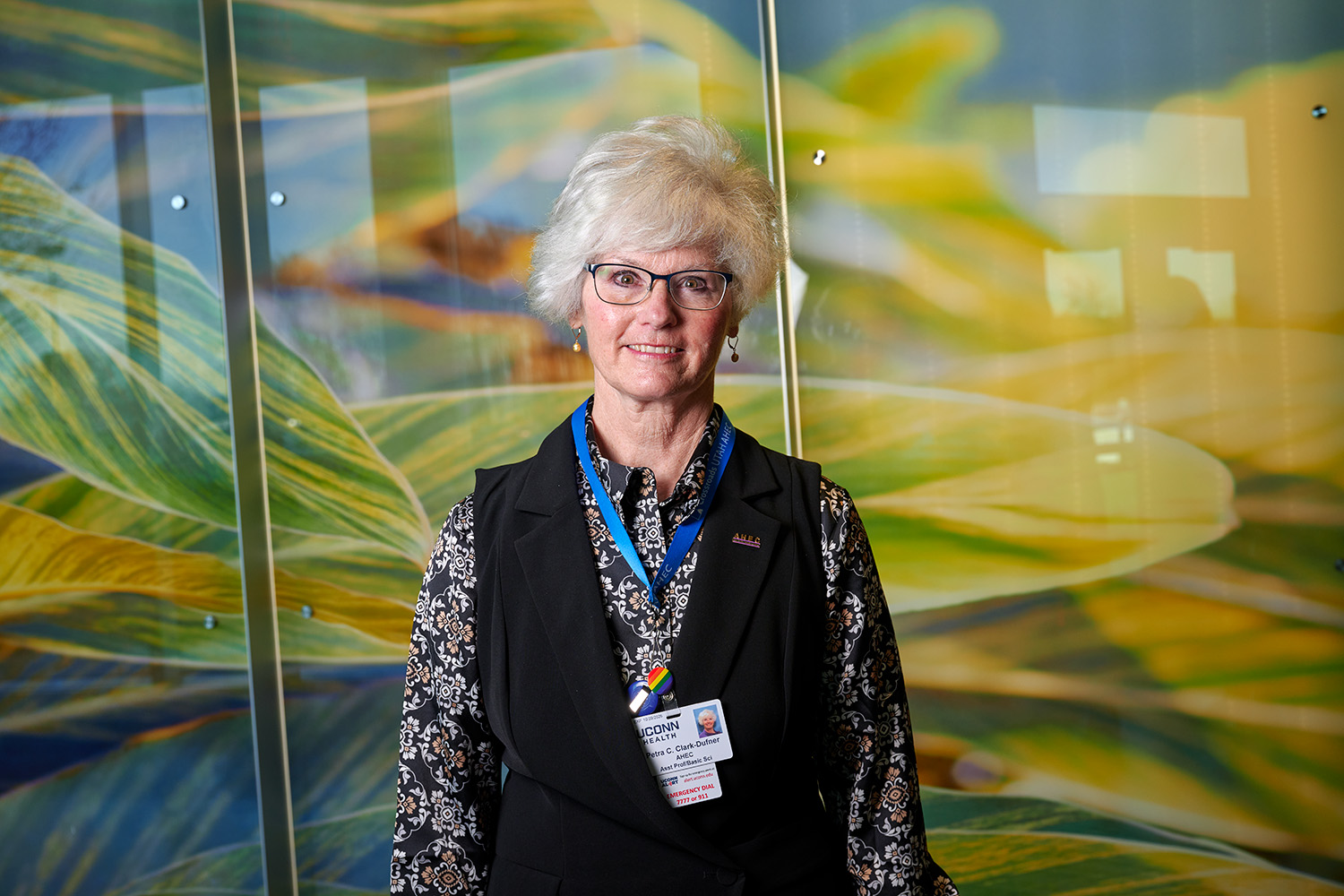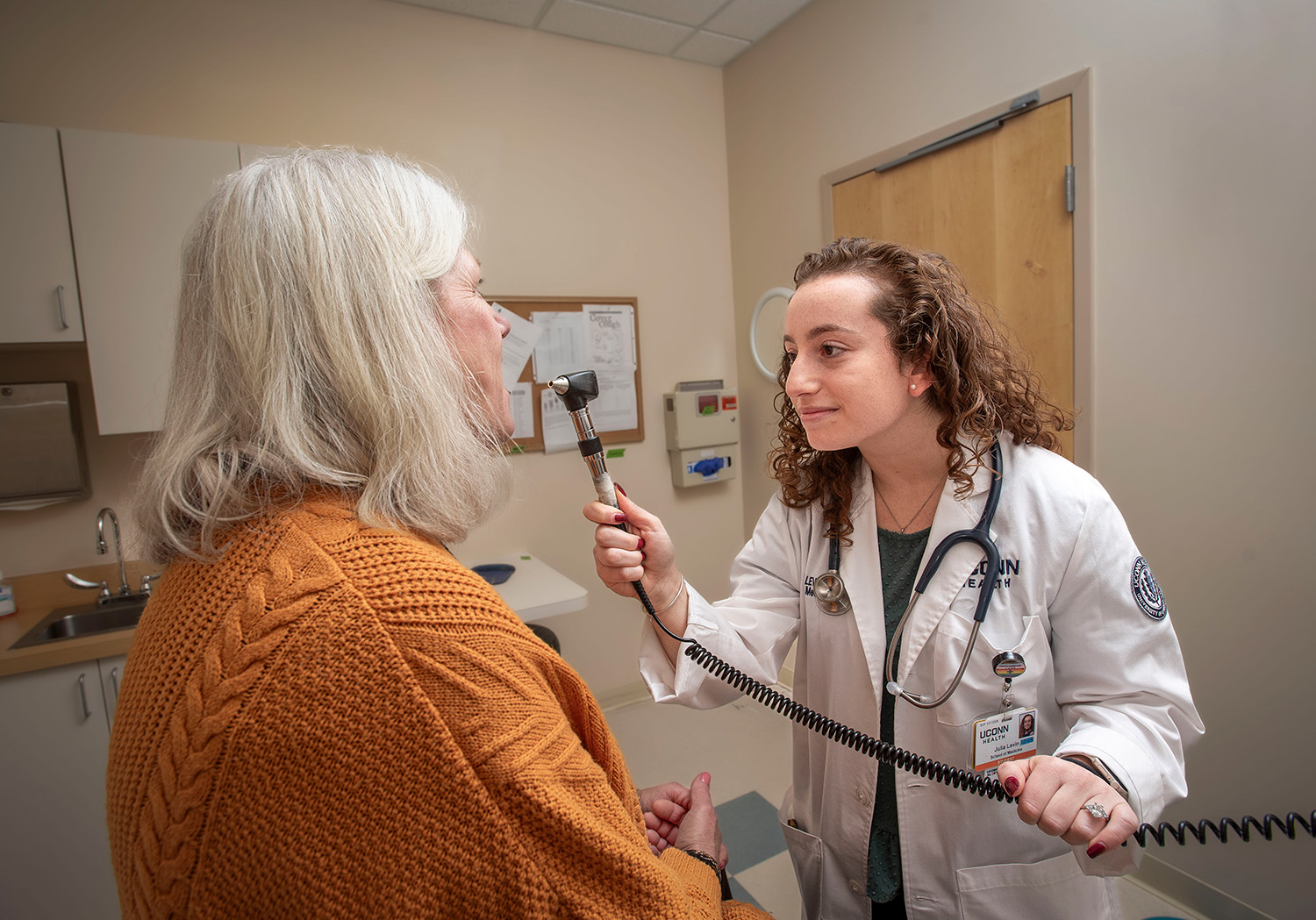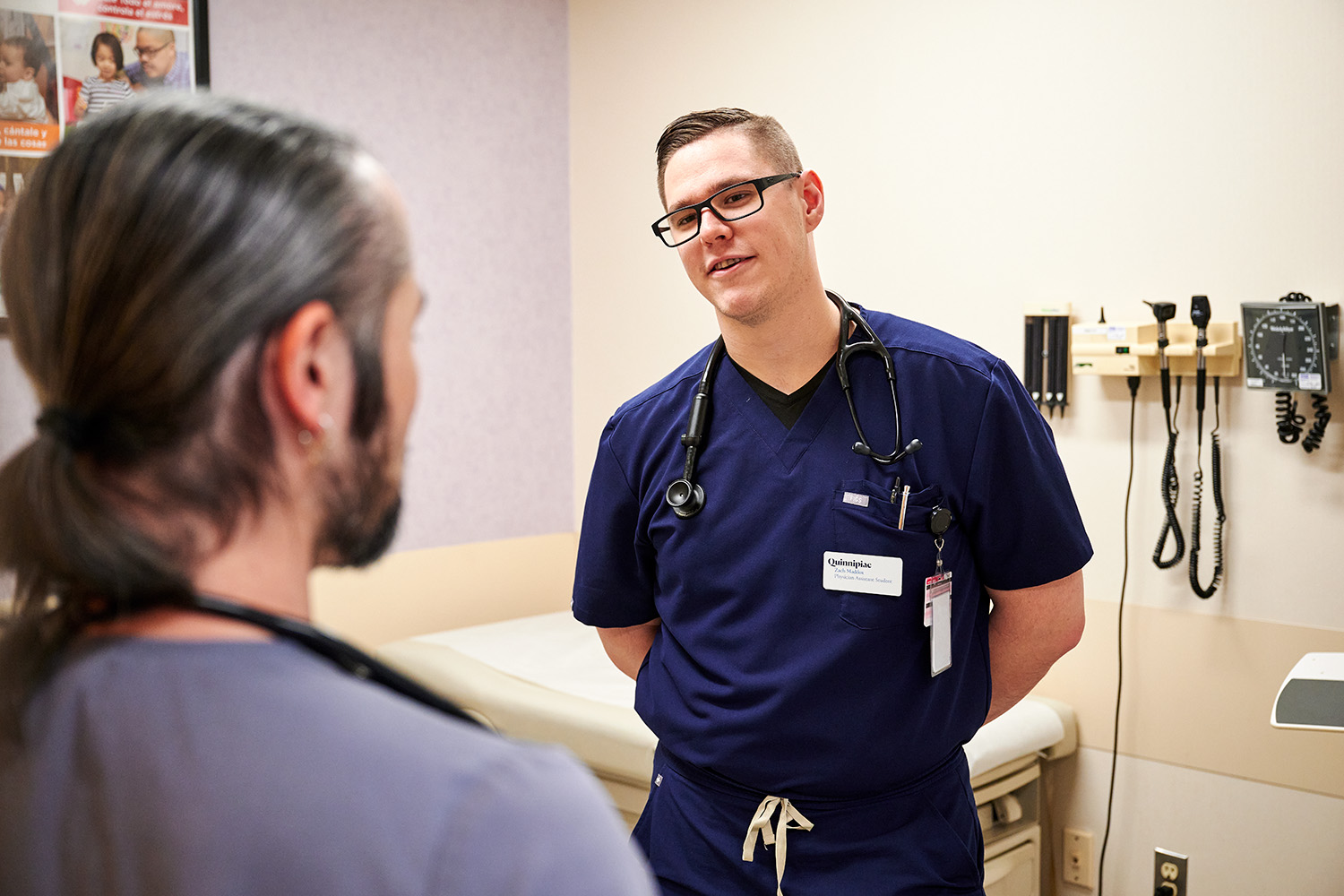An Urban Health Care Bootcamp

Petra Clark-Dufner at UConn John Dempsey Hospital in Farmington, Connecticut last December.
Petra Clark-Dufner ’81 MA is a force, calling on students rapid fire, but gently and with humor, cajoling answers from the health care professionals at this urban services bootcamp and keeping them on their toes. “Zach,” she says, pointing to a young man in the back. “Talk to me about the windows. In terms of your rotation, does any of this have relevance to what you just did? Talk to me.”
The physician assistant resident replies, “You need to assess how the patient is feeling. And with the windows, you can find out very quickly where you need to dive deeper.”
“Excellent,” Clark-Dufner says.
For nearly two decades, Clark-Dufner has been training students of health care as director of UConn’s Urban Service Track Scholars Program (UST), part of the Connecticut Area Health Education Center. She is now on her 17th cohort, of about 65 students each, in the two-year program that started in 2007. The broad mission is good, accessible health care for everyone. The students, who clearly adore Clark-Dufner, come from the schools of Medicine, Dentistry, Nursing, Pharmacy, and Social Work, as well as the Quinnipiac University physician assistant program.
“We have retreats, shared reading assignments, interprofessional learning communities, a student-alumni podcast series, and community-based clinical trainings and experiences,” Clark-Dufner says. “We look at things like health care financing, cultural humility, advocacy, health promotion, basic screenings, but more importantly, how to engage and talk to the community members and patients.”

Second-year medical student Julia Levin, at ProHealth Physicians Glastonbury Primary Care, says Urban Service Track taught her to look for the root causes of a patient’s ailment.

Zachary Maddox, a physician assistant resident at Optimus Health Care in Bridgeport, Connecticut, keeps this in mind from UST: “You have to realize, someone is seeing you on the worst day of their life … you have to learn to listen to their perspective, not yours.”
Part of that education involves a two-part bootcamp where students receive hands-on training at UConn Health in Farmington. They learn how to approach and communicate with patients, focusing on five essential windows into a patient’s health. They look at skin, the literal boundary between the body and the viruses and toxins and microbes that make us sick. They look at eyes, not just for the emotions they might reveal, but because they are portals through which a provider can observe the circulatory system and the brain. They look at how much pain a patient is experiencing, where it comes from, and how it presents. They look at a patient’s nutrition — what a patient eats can show how much attention they are paying to their health. In the same way, Urban Service Track Scholars are taught to look at a patient’s feet, because if a patient hasn’t been clipping their toenails or washing between their toes, they may be neglecting other kinds of self care, and the feet are a place where chronic illness can first appear.
Student perspectives
Zach Maddox, 31, comes to the program, and this bootcamp, from law enforcement in Manchester, New Hampshire, where, working with the sheriff’s office, he saw people he couldn’t help. He’s now at Quinnipiac, training to be a physician assistant, specializing in emergency medicine.
“You have to train for those scenarios because you have to realize, someone is seeing you on the worst day of their life,” Maddox says. “Whatever you yourself have been through that day, for the person in front of you, they are struggling. You have to learn to listen to their perspective, not yours. The situation isn’t always what meets the eye. A suicidal patient is going to tell you, ‘I’m fine.’ I had a deep conversation with a man who had Lou Gehrig’s disease, who some people thought was depressed. But we talked about his wife, and his son, and making sure his benefits would come to him, and his funeral expenses, and the things that were weighing on him. It’s about human interactions.”
Julia Levin ’21 (CLAS) is a second-year medical student from Dartmouth, Massachusetts, who wants to provide primary care. “When you see a patient in a clinic, you’re first considering the acute reason they’re there — foot pain, weight loss, chest pain,” she says, “but Urban Service Track teaches you how to look beyond that, to consider what aspects of a patient’s life are causing that specific ailment. I wouldn’t call it old fashioned, but it brings us back to what the root of good medicine is. As doctors, there’s an aspect of privilege. We all have biases. We have to learn to help patients according to what they need and not who they are or where they come from. UST gives you the tools you need.”
Where it counts
UST students collaborate with community partners to provide care and outreach to the medically underserved, through kids’ camps, homeless shelters, senior centers, schools, free clinics, community health fairs, special outreach events, even giving vaccinations door to door.
“We tell our students to be change agents,” Clark-Dufner says. “Some of our students who actually come from underserved backgrounds take what they’ve learned and go back into those communities, but we’ve also had students from suburban communities, or rural communities, who have felt passionate about what we’re teaching. Everyone who goes into medicine is compassionate, but our students have a different level.”
Clark-Dufner is a change agent supreme, modeling for her students the empathy, energy, and motivation they will need. “I’m not a clinician,” she says. “I’m an educator, from a family of educators. Every single student is worth the investment of time and nurturing. It’s been a wonderful challenge.”
By Peter Nelson
Photos by Peter Morenus and Sean Flynn

Leave a Reply